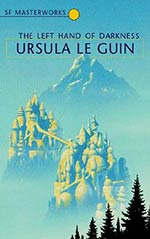
![]() jfrantz
jfrantz
7/10/2012
![]()
Genly Ai is the sole envoy from an interplanetary consortium of humans, called the Ekumen, to the frozen planet Winter. His mission is to convince the Gethenians (the ambisexual natives of Winter) to join the Ekumen. Their vast gulfs in physiology and culture however, lead to an initial failure which eventually leads to Genly's exile and imprisonment. But his near-death experiences both in the freezing and hungry prison camp and in his freezing and hungry escape give him a more thorough understanding of the nature of the people of Winter than he had gained in his two years prior, living on Winter.
Transformational SF
There is an excess of proselytizing attendant to The Left Hand of Darkness across the web, both depicting Le Guin as the response to a genre Brian Aldiss characterized as a "Ghetto of Retarded Boyhood" while others will lament it as a failed attempt at injecting feminism into the genre. I think, as is often the case with polarized criticism of great works of art such as this, they are both right, and yet they are both wildly off the mark.
Despite its relative brevity, it is a book of slow unfoldings and gradually coming to know. It is a book of intellectual complexity and carefulness in storytelling that ranks with the very best of SF up to that point. It is really no surprise that it's taught in university courses and generally conceived as the literary height of SF.
Le Guin has discussed her inspiration for this book as the work of such transformational feminist thinkers as Betty Freidan and Simone de Beauvoir and more specifically that in putting this story to paper she sought to explore the function and necessity of gender. Certainly, one could make the argument that the timing was right for a feminist infusion into the genre, but her fluid treatment of love and gender roles was impassioned and poignant. Combined with a rich (and delightfully cynical) portrayal of political maneuvering and betrayal, Le Guin's elevation to the pantheon of feminist literature is well deserved.
And yet... I found myself reading this as something of a reflection of her time rather than a seminal work of feminist fiction. I found it completely mystifying that, in trying to discuss gender, Le Guin allowed herself to become so thoroughly distracted by sex. Perhaps I'm benefiting from about 40 more years of feminist thought than she was operating with, but at the very least, Le Guin's confusion of the two absolutely detracts from the message. Luckily, the treatment and physiology of Gethenian ambisexuality was thoroughly enchanting and though Le Guin's message suffers for it, I don't think the story does.
TLHoD doesn't escape unscathed though. From the very beginning, Gethenians are characterized as something altogether foreign to Genly and something wholely different from humans on Earth, where every aspect of culture and society are governed by the perversion and dualism of their bisexuality. Perhaps it was a product of operating in a genre saturated with masculinity, or maybe it was the difficulty in conveying the complexity of Gethenian society. Whatever it was, Le Guin herself acknowledges a near constant reversion to duality in gender roles and despite their apparent ambiguity, her characters tend to exude a decided masculinity. How well or poorly you receive this, I think, will shape your conception of the brilliance of Le Guin's message. I myself was put off by it, and I think it is the principal detraction from my desire to erect a shrine to Le Guin in my living room.
TLHoD is one of those books that people love to read and love to criticize (clearly I'm included in this lot). Her message is admittedly muddled but I think in the end, that is okay, especially in this case where the effect of opening up the discussion to the genre was akin to something like discovering the world wasn't flat--it completely changed our way of conceptualizing the world. Sure devotees are correct in calling out Le Guin's departure from the male domination of the genre, but they would go too far in lumping TLHoD in with their own reproach of the genre. Le Guin was not just a SF writer, but also a fan. And yes, the critics are right too--TLHoD isn't perfect, but then, when would we ever judge anything so? It would seem to me that whether Le Guin's feminism "went far enough" is immaterial when the book made such an astronomical impact on the entire world of literature.
Somehow, this will probably not end up being one of my favorite stories, but there is no way around it, TLHoD will forever color the way I read SF and probably a lot of mainstream literature as well.
Recommendation
This is a book that sticks to your ribs. The concepts may be muddled, the characters sometimes boring, but the whole is greater than the sum of its parts and what is sure to be one of my most memorable reading experiences. It is not a book that I will make an effort to re-read anytime soon, but it will be a book that occupies a great deal of my mind-space for a good long time. If you haven't read it, The Left Hand of Darkness exists as a special moment in time, a major life-event in the history of SF and any experience of the genre should be considered incomplete without it.
http://hugoenduranceproject.blogspot.com/2012/07/left-hand-of-darkness.html